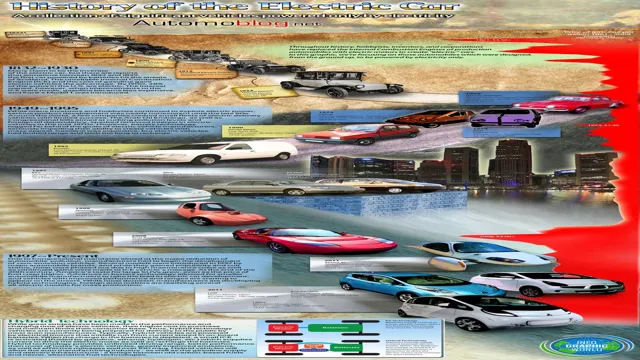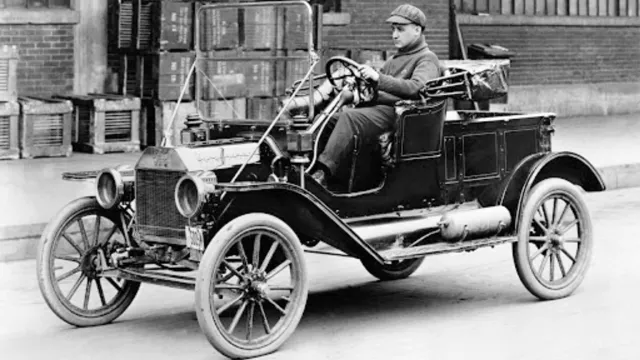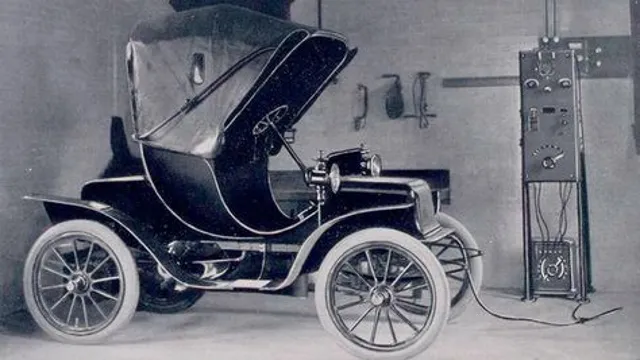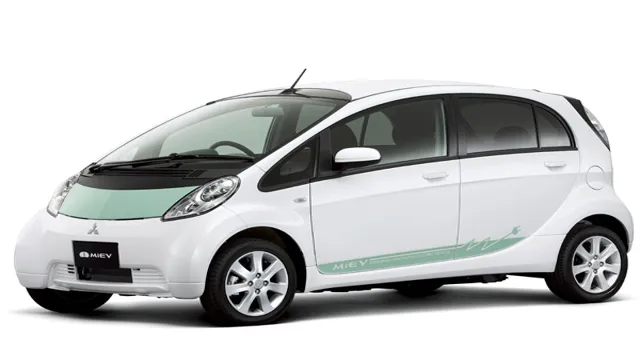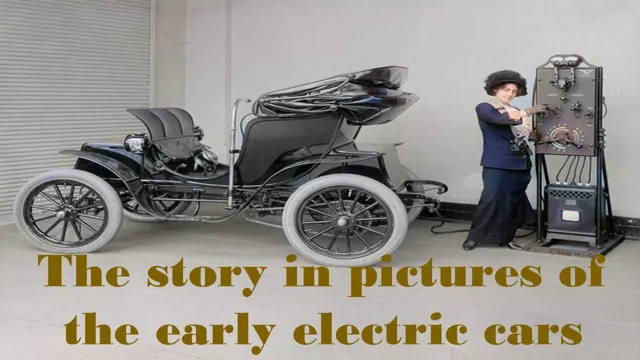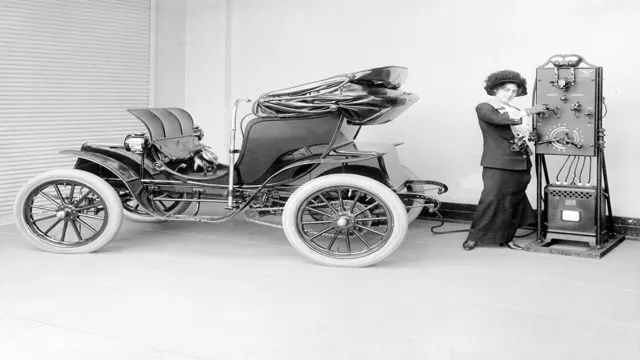How Electric Cars Revolutionized the Automotive Industry: A Fascinating History
Electric cars have taken the automobile industry by storm, providing a cleaner, more efficient mode of transportation. But did you know that electric cars have been around for over a century? That’s right, long before Tesla and other modern electric car manufacturers, there were pioneers like Thomas Edison and T. H.
Parker who were experimenting with electric cars in the late 1800s. The first electric car was built in 1832 by Scottish inventor Robert Anderson, but it wasn’t until the 20th century that electric cars started to become more mainstream. Let’s take a journey through the history of electric cars and explore how they have evolved into the vehicles we know today.
Early Developments
The history of electric cars traces back to the early developments of the 19th century. The first practical electric vehicle was invented by a Scottish inventor, Robert Anderson in 183 However, it wasn’t until the late 1800s that electric cars became a viable mode of transportation due to the development of rechargeable batteries.
By the turn of the century, electric cars had become hugely popular, with many major car manufacturers producing electric models. However, the rise of gasoline-powered vehicles led to the decline of electric cars in the early 20th century. Despite this setback, electric vehicles remained in use in some niche markets such as delivery trucks and golf carts.
The recent advancements in battery technology and environmental concerns have brought electric vehicles back into the limelight as a viable alternative to fossil fuel-powered cars. Today, electric cars are becoming increasingly popular, and major car manufacturers are investing heavily in their development, making it clear that electric cars are here to stay.
Beginnings of Electric Cars
Electric Cars The development of electric cars dates back to the 19th century. In 1834, Thomas Davenport designed the first electric vehicle, which was a toy car. However, it was not until the 20th century that electric cars began to gain traction.
The early development of electric cars was slow due to the high cost of production, limited battery technology, and a lack of charging infrastructure. In the early 1900s, gasoline-powered cars became dominant, and electric cars were pushed to the sidelines. However, in the 1970s, electric cars experienced a resurgence due to concerns about pollution and the availability of oil.
Major automobile manufacturers invested in the development of electric cars, and progress was made in battery technology and charging infrastructure. Despite the progress made, electric cars only made up a small percentage of the global automotive market until the 21st century when sales began to increase significantly, and they became much more commonplace.
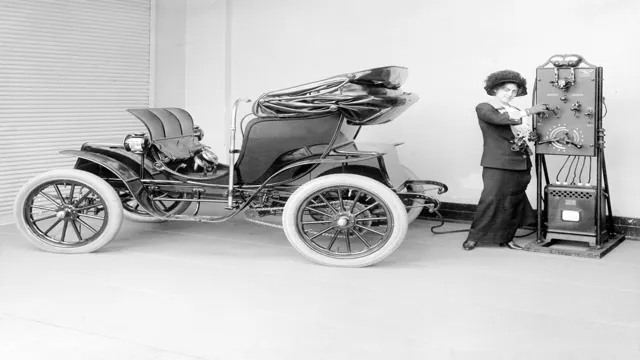
The First Electric Vehicle
When we think of electric vehicles today, we often picture sleek, futuristic designs with long ranges and luxurious interiors. However, the first electric vehicle was a far cry from this image. In fact, it was developed over 130 years ago, in the late 19th century.
The first electric vehicle was a tricycle built by Thomas Parker, a British inventor, who was ahead of his time in recognizing the potential of electric power. Parker’s tricycle was powered by rechargeable batteries that were positioned under the seat. Although it could only travel at a slow speed of 10 mph, it was a groundbreaking invention and paved the way for the development of more advanced electric vehicles in the future.
Parker’s tricycle proved that electric power was a viable alternative to gasoline and diesel-fueled vehicles, and could be a solution to the growing concern of air pollution and climate change. It’s interesting to see how far we’ve come since Parker’s tricycle, and the exciting possibilities for the future of electric transportation.
Competition with Gasoline Cars
During the early days of electric car development, competition with gasoline-powered cars was fierce. Gasoline cars had already been in use for decades, and the infrastructure for fueling and repairing them was well-established. Conversely, electric cars were a relatively new idea that required a whole new infrastructure to support them.
Additionally, early electric cars had a limited range and were much slower than their gasoline counterparts. Despite these initial challenges, electric car manufacturers continued to refine their technology and improve their range, speed, and reliability. As a result, electric cars are now a viable alternative to traditional gasoline cars, with many modern electric vehicles able to match or even surpass the performance of their gasoline-powered counterparts.
Modern Advances
The history of electric cars dates all the way back to the 19th century. However, it wasn’t until recent years that the technology advanced enough to make them a viable option for mainstream consumers. Today, modern electric cars offer a range of benefits that traditional gasoline-powered cars cannot match.
For example, electric cars produce little to no harmful emissions, making them a much greener and sustainable choice. Additionally, they are incredibly efficient, with many models capable of traveling over 200 miles on a single charge. Furthermore, electric cars have much lower maintenance costs compared to traditional cars, which means less time and money spent on repairs and upkeep.
With all of these benefits, it’s no surprise that electric cars are quickly gaining popularity among consumers and experts alike as the future of sustainable transportation.
Revival of Electric Cars in the 90s
The revival of electric cars in the 90s was a major milestone in the history of the automobile industry. Modern advances in battery technology, electric motors, and charging infrastructure have made electric cars more practical and accessible than ever before. The introduction of lithium-ion batteries, the same technology used in laptops and smartphones, has greatly increased the range of electric cars, allowing drivers to travel farther than ever before on a single charge.
Moreover, the development of fast-charging stations has made it possible to recharge an electric car quickly and conveniently, making long trips a viable option for drivers. These modern advances have also made electric cars more efficient, with electric motors providing instant torque and requiring less maintenance than their gas-powered counterparts. With these improvements, electric cars are becoming more popular and are poised to play a major role in the future of the automotive industry.
Introduction of the Tesla Roadster
The introduction of the Tesla Roadster was a game-changer in the automotive industry. This electric sports car brought modern advances in technology to the forefront and seriously raised the bar for what electric vehicles could achieve. With its sleek, aerodynamic design and powerful acceleration, the Roadster was not only environmentally friendly, but a force to be reckoned with on the road.
Not only did it improve upon previous electric vehicle models, but it set new standards for what electric cars could offer in terms of performance and efficiency. The Tesla Roadster truly exemplified what it meant to drive the future.
Expansion of the Electric Car Market
The electric car market has been expanding at a rapid pace in recent years, thanks to modern advances in technology. One key development is the improvement of battery technology, which has made electric vehicles more practical and cost-effective for everyday use. Another major factor is the growth of charging infrastructure, which makes it easier for people to charge their cars on the go.
In addition, advances in electric motor technology have made these vehicles more efficient and powerful, allowing them to compete with traditional gas-powered cars. With these innovations, more and more people are choosing to go electric, and this trend is expected to continue for years to come. So if you’re looking for a car that is both environmentally friendly and cost-effective, then electric may be the way to go!
The Future of Electric Cars
The history of electric cars dates back to the 19th century when electric vehicles were first introduced as a viable alternative to fuel-powered vehicles. Over the years, electric cars have undergone significant transformations, from the basic designs of the past to the advanced models available today. The growing awareness of climate change and the push for environmentally-friendly technologies have brought electric cars to the forefront of modern transportation.
It is predicted that the future of electric cars is bright, with more and more manufacturers investing in the technology to improve efficiency, performance, and affordability. Major carmakers like Tesla, Nissan, and Audi are already leading the way in the electric car revolution, offering models that cater to a diverse range of consumer needs. As technology advances, we can expect to see electric cars become even more popular and widespread, contributing to a greener and more sustainable future.
Advancements in Battery Technology
Electric cars are slowly becoming more popular and widely used as advancements in battery technology make them more practical and efficient. The future of electric cars looks bright as research and development continue to improve energy density, charging times, and durability of batteries. However, one of the main concerns with electric cars is the limited range, and the need for frequent charging.
With the introduction of solid-state batteries, this will become less of an issue, as they offer higher energy density and faster charging times. Just like upgrading from a flip phone to a smartphone with a bigger battery, the introduction of solid-state batteries to electric cars will lead to longer-lasting and more reliable vehicles. This will not only increase the appeal of electric cars, but it will also make them more practical for long-distance traveling.
As electric cars become more prevalent, the increased demand for batteries will lead to more research and development into battery technology, ultimately leading to a brighter and more sustainable future.
Growing Demand for Sustainable Transportation
Electric cars are the future of sustainable transportation. With growing concerns over carbon emissions and the depletion of natural resources, consumers are turning to eco-friendly solutions to address these issues. Electric cars have made significant strides in recent years, with advancements in technology making them more affordable and efficient.
Not only do they produce zero emissions, but they also offer a smooth, quiet ride and require less maintenance than traditional vehicles. In addition, governments are offering incentives and subsidies for consumers to switch to electric cars, making them an even more attractive option. While there are still some concerns over battery life and charging infrastructure, the benefits of electric cars are clear, and it is only a matter of time before they become the norm on our roads.
So, are you ready to join the electric car revolution and help create a cleaner, greener future?
Conclusion
In conclusion, the history of electric cars is a vibrant tapestry of innovation, experimentation, and adaptation. From the early days of primitive batteries to the cutting-edge advancements in modern electric vehicles, the journey of electric cars has been nothing short of electrifying! While there have been pitfalls and challenges along the way, the future of electric cars looks brighter than ever, with more and more people embracing this clean and sustainable mode of transportation. So as we charge forward into a new era of mobility, let us remember the pioneers and dreamers who dared to imagine a world powered by electricity, and let us carry their legacy forward with spark and determination!”
FAQs
What is the history of electric cars?
Electric cars have been around since the 19th century, but they didn’t become popular until more recently. The first electric car was built in 1837, but it wasn’t until the 1990s that they began to gain traction in the automotive industry.
Who invented the first electric car?
The first electric car was invented by Robert Anderson in Scotland in 1837. However, it was not until the development of rechargeable batteries in the 19th century that the electric car became more practical.
What caused the decline of electric cars in the early 20th century?
The decline of electric cars in the early 20th century can be attributed to several factors, including the discovery of vast oil reserves, advancements in gasoline-powered cars, and the lack of infrastructure to support electric vehicles.
What led to the recent resurgence of electric cars?
The recent resurgence of electric cars can be attributed to several factors, including concerns about climate change, the rising cost of gas, and advancements in technology, including better batteries and more advanced charging stations. Additionally, government incentives and regulations have played a role in encouraging the production and adoption of electric cars.

